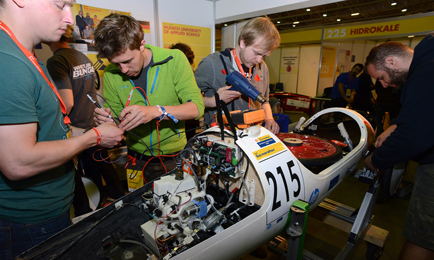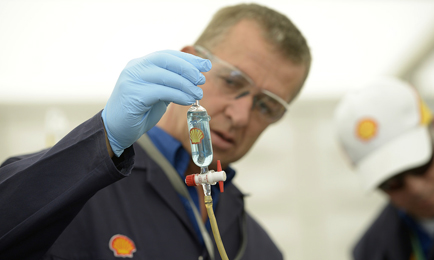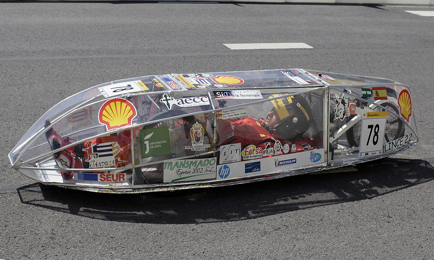The race meeting held in Rotterdam earlier this month was different from the normal, loud, fast, personality-driven races held elsewhere in Europe at this time of year.
Over the course of five days, around 200 different vehicles, a mix of prototypes and urban concepts, travelled around a street circuit to find out which could go the furthest on the least amount of fuel.
The winners were Team Microjoule, not a group of research scientists, but a group of budding young French engineers from La Joliverie secondary school in France. They were part of the annual final of the Shell Eco-marathon, an international competition that challenges teams of students from all over the world to design, make and race a car that will travel the furthest on just a single litre or of fuel or 1 kWh equivalent of power.
Microjoule, who have won several Eco-marathons – broke their previous track record with a result of 3,315 km, an improvement of 11% over last year's car.Norman Koch, technical director of Shell Eco-Marathon, attributes the performance to the team's attention to detail and the warm and calm weather. “The top teams pay attention to every aspect of the vehicle and to the third degree effects,” he says. “They don't just look at the nitty gritty, if there is a part which you can reduce the weight of by 5% they'll do it.”
“You get some teams who you think should be working in F1. Some you see working through the night just to get the body of the car on.”
The European competition is one of three finals held around the world and is the largest and most established, attracting 198 teams from 27 countries, around 3,000 students over five days. Finals are also held every year in the US and for Asia in the Philippines. Koch says: “The competition is really about getting the brightest engineering minds across all continents to address a huge challenge. They are the leaders of the future who at an average age of 20 are already building the world's most fuel efficient vehicles.”

The Eco-marathon can trace its history back to 1939, when Shell scientists based in Illinois in the US had a friendly bet to see whose car could travel the furthest on one gallon of fuel. A Studebaker won which did 21km/L (60mpg). Since then the competition was a regular occurrence in the company's calendar, at one time being held at the company picnic.
Since relaunching in its modern form in 1985, the competition has grown and is today oversubscribed by entrants. In total, some 10,000 students from 45 different countries participated in Eco-marathon this year. Koch sees no reason why the competition won't continue growing to include more than 100 countries. “We're heading towards 50 next year,” he says. “I spend a lot of time visiting universities and holding workshops. Engineering students are the same the world over. It's doesn't matter if I'm in Galway or Riyadh, they're keen and motivated, alive to the issues, they even make the same mistakes. The only way you can tell the difference sometimes is by the clothes they wear.”

Koch has just returned from the Middle East, where he has been laying the groundwork for Shell's first Eco-marathon for the Middle East and Africa, which is due to be held in 2016. The competition has only recently expanded outside of Europe - the first Eco-marathon was held in the US in 2007, and in Asia in 2010. The American Eco-marathon, which has around 125 teams including teams from Canada and South America, will be moved from Houston to be held in Detroit next year. The Asian Eco-marathon in Manila is also growing strongly, with teams from India, Pakistan and China and other parts of Asia.
The competition is embedded deepest in the schools and universities of Europe, where it has been running the longest. But Koch says the US and Asian engineering students are not far behind, with the winner in the ethanol category in Asia reaching 2700km last year, only 57km off the European winner.
As well as liasing with industry and academia about the competition, Koch heads up all of the technical aspects of the competition. The competition is grounded in the real world problem of increasing energy efficiency in mobility. The Eco-marathon is therefore divided into six energy categories to reflect: petrol, diesel, ethanol biofuel, hydrogen fuel cell, gas to liquid fuel and from next year compressed natural gas.
Teams start developing their cars a year before the competition. There is a 50 page rulebook and a high level of scrutiny from Shell engineers, but, says Koch, the organisers try not to stifle creativity. Most teams start with a standard 50cc honda strimmer engine and then modify it, for example wrapping it in foil to reduce heat losses. Some of the innovations developed over the years have even transferred into the the mainstream industry. Stop / start engine technology and cylinder switch off was “done by teams in the Eco-marathon in the 1980's”, he says. Teams also partner with engineering companies to leverage resources and expertise. Recently, a team partnered with SKF on a project that resulted in a patented design for ceramic needle bearings.

Although he won't reveal the budget, it's clear the Eco-marathon is expensive, and Koch says the programme represents Shell's single largest investment in an event. Part of the reason for the event is to safeguard a pipeline of future scientific and technical talent for itself, but the overriding reason, he says, is to mould the next generation of engineers and shape the way they think. He says: “It's a hands-on activity and they have the mindset to take what work they've done into industry. It's not just about driving reductions fuel consumption, it's about being mindful of where the opportunities for gains lie – a lesson that's at the heart of most engineering.
“We are responsible for our own success, by providing young people with the opportunity to do something and learn at the same time. And now, having Shell Eco-marathon on your CV is an advantageous thing.”
The next event will be a competition in Johannesburg later this year, to cater for the South African students who were unable to attend the European event. There are plans to hold up to ten local events a year, to cater for the large number of students who are participating but don't attend a final.
It's a far cry from a challenge between engineers and their Studebakers in 1939, but the success of today's global Eco-marathon shows what can be achieved in the common language of engineering when the resources of a global corporation are applied. Perhaps a source of future innovations, but always a source of inspiration, the marathon with a difference may soon be heading to a city near you.